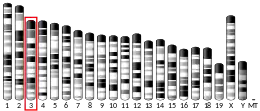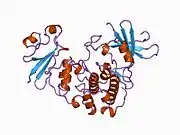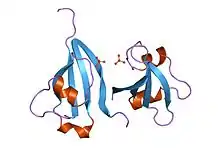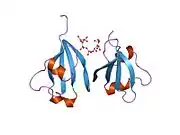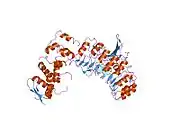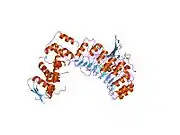CKS1B
Cyclin-dependent kinases regulatory subunit 1 is a protein that in humans is encoded by the CKS1B gene.[5][6]
| CKS1B | |||||||||||||||||||||||||||||||||||||||||||||||||||
|---|---|---|---|---|---|---|---|---|---|---|---|---|---|---|---|---|---|---|---|---|---|---|---|---|---|---|---|---|---|---|---|---|---|---|---|---|---|---|---|---|---|---|---|---|---|---|---|---|---|---|---|
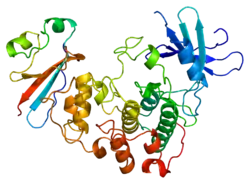 | |||||||||||||||||||||||||||||||||||||||||||||||||||
| |||||||||||||||||||||||||||||||||||||||||||||||||||
| Identifiers | |||||||||||||||||||||||||||||||||||||||||||||||||||
| Aliases | CKS1B, CKS1, PNAS-16, PNAS-18, ckshs1, CDC28 protein kinase regulatory subunit 1B | ||||||||||||||||||||||||||||||||||||||||||||||||||
| External IDs | OMIM: 116900 MGI: 1889208 HomoloGene: 123798 GeneCards: CKS1B | ||||||||||||||||||||||||||||||||||||||||||||||||||
| |||||||||||||||||||||||||||||||||||||||||||||||||||
| |||||||||||||||||||||||||||||||||||||||||||||||||||
| |||||||||||||||||||||||||||||||||||||||||||||||||||
| |||||||||||||||||||||||||||||||||||||||||||||||||||
| Wikidata | |||||||||||||||||||||||||||||||||||||||||||||||||||
| |||||||||||||||||||||||||||||||||||||||||||||||||||
Function
The CKS1B protein binds to the catalytic subunit of the cyclin-dependent kinases and is essential for their biological function. The CKS1B mRNA is found to be expressed in different patterns through the cell cycle in HeLa cells, which reflects a specialized role for the encoded protein.[6]
CKS1B and CKS2 proteins have demonstrated principal roles in cell cycle regulation. Defined originally as suppressors of mutations in both fission and budding yeast Cdk1 genes, Cks molecules interact with Cdk1, Cdk2 and Cdk3. These Cdk-dependent enzyme complexes in cell cycle regulation frequently consist of Cdk molecules bound to a catalytic Cdk subunit, i.e. Cks and a regulatory cyclin subunit, such as a G1 cyclin, controlling Cdk function by directing cyclin-cdk complex activity toward specific and significant substrates. Malfunctions of cdk-dependent associations lead to defects into the entry of mitosis for cells.[7]
Cks1 in the Cdk-independent pathway involves the recognition of substrates p27Kip1 and p21cip1 by directly associating with E3 SCFSkp2 when stimulated by certainmitogenic signals, such as TGF-β.[8]
Clinical significance
Cks1-depleted breast cancer cells not only exhibit slowed G(1) progression, but also accumulate in G(2)-M due to blocked mitotic entry. Cdk1 expression, which is crucial for M phase entry, is drastically diminished by Cks1 depletion, and that restoration of cdk1 reduces G(2)-M accumulation in Cks1-depleted cells.[9]
References
- GRCh38: Ensembl release 89: ENSG00000173207 - Ensembl, May 2017
- GRCm38: Ensembl release 89: ENSMUSG00000028044 - Ensembl, May 2017
- "Human PubMed Reference:". National Center for Biotechnology Information, U.S. National Library of Medicine.
- "Mouse PubMed Reference:". National Center for Biotechnology Information, U.S. National Library of Medicine.
- Richardson HE, Stueland CS, Thomas J, Russell P, Reed SI (Dec 1990). "Human cDNAs encoding homologs of the small p34Cdc28/Cdc2-associated protein of Saccharomyces cerevisiae and Schizosaccharomyces pombe". Genes Dev. 4 (8): 1332–44. doi:10.1101/gad.4.8.1332. PMID 2227411.
- "Entrez Gene: CKS1B CDC28 protein kinase regulatory subunit 1B".
- Harper, J.W. 2001. Protein destruction: Adapting roles for Cks proteins. Cur Biol. 11: R431–R435
- Xu, K., Belunis, C., et al. 2003. Protein-protein interactions involved in the recognition of p27 by E3 ubiquitin ligase. Biochem J. 371: 957–964.
- Westbrook L, Manuvakhova M, Kern FG, Estes NR, Ramanathan HN, Thottassery JV (December 2007). "Cks1 regulates cdk1 expression: a novel role during mitotic entry in breast cancer cells". Cancer Res. 67 (23): 11393–401. doi:10.1158/0008-5472.CAN-06-4173. PMID 18056467.
- Wang W, Ungermannova D, Chen L, Liu X (August 2003). "A negatively charged amino acid in Skp2 is required for Skp2-Cks1 interaction and ubiquitination of p27Kip1". J. Biol. Chem. 278 (34): 32390–6. doi:10.1074/jbc.M305241200. PMID 12813041.
- Sitry D, Seeliger MA, Ko TK, Ganoth D, Breward SE, Itzhaki LS, Pagano M, Hershko A (November 2002). "Three different binding sites of Cks1 are required for p27-ubiquitin ligation". J. Biol. Chem. 277 (44): 42233–40. doi:10.1074/jbc.M205254200. PMID 12140288.
- Ganoth D, Bornstein G, Ko TK, Larsen B, Tyers M, Pagano M, Hershko A (March 2001). "The cell-cycle regulatory protein Cks1 is required for SCF(Skp2)-mediated ubiquitinylation of p27". Nat. Cell Biol. 3 (3): 321–4. doi:10.1038/35060126. PMID 11231585. S2CID 9638655.
- Calvisi DF, Pinna F, Meloni F, Ladu S, Pellegrino R, Sini M, Daino L, Simile MM, De Miglio MR, Virdis P, Frau M, Tomasi ML, Seddaiu MA, Muroni MR, Feo F, Pascale RM (June 2008). "Dual-specificity phosphatase 1 ubiquitination in extracellular signal-regulated kinase-mediated control of growth in human hepatocellular carcinoma". Cancer Res. 68 (11): 4192–200. doi:10.1158/0008-5472.CAN-07-6157. PMID 18519678.
External links
- Human CKS1B genome location and CKS1B gene details page in the UCSC Genome Browser.
Further reading
- Arvai AS, Bourne Y, Hickey MJ, Tainer JA (1995). "Crystal structure of the human cell cycle protein CksHs1: single domain fold with similarity to kinase N-lobe domain". J. Mol. Biol. 249 (5): 835–42. doi:10.1006/jmbi.1995.0341. PMID 7791211.
- Bourne Y, Watson MH, Hickey MJ, et al. (1996). "Crystal structure and mutational analysis of the human CDK2 kinase complex with cell cycle-regulatory protein CksHs1". Cell. 84 (6): 863–74. doi:10.1016/S0092-8674(00)81065-X. PMID 8601310. S2CID 854793.
- Demetrick DJ, Zhang H, Beach DH (1996). "Chromosomal mapping of the human genes CKS1 to 8q21 and CKS2 to 9q22". Cytogenet. Cell Genet. 73 (3): 250–4. doi:10.1159/000134349. PMID 8697818.
- Ganoth D, Bornstein G, Ko TK, et al. (2001). "The cell-cycle regulatory protein Cks1 is required for SCF(Skp2)-mediated ubiquitinylation of p27". Nat. Cell Biol. 3 (3): 321–4. doi:10.1038/35060126. PMID 11231585. S2CID 9638655.
- Sitry D, Seeliger MA, Ko TK, et al. (2003). "Three different binding sites of Cks1 are required for p27-ubiquitin ligation". J. Biol. Chem. 277 (44): 42233–40. doi:10.1074/jbc.M205254200. PMID 12140288.
- Seeliger MA, Breward SE, Itzhaki LS (2003). "Weak cooperativity in the core causes a switch in folding mechanism between two proteins of the cks family". J. Mol. Biol. 325 (1): 189–99. doi:10.1016/S0022-2836(02)01202-0. PMID 12473461.
- Strausberg RL, Feingold EA, Grouse LH, et al. (2003). "Generation and initial analysis of more than 15,000 full-length human and mouse cDNA sequences". Proc. Natl. Acad. Sci. U.S.A. 99 (26): 16899–903. Bibcode:2002PNAS...9916899M. doi:10.1073/pnas.242603899. PMC 139241. PMID 12477932.
- Xu K, Belunis C, Chu W, et al. (2003). "Protein-protein interactions involved in the recognition of p27 by E3 ubiquitin ligase". Biochem. J. 371 (Pt 3): 957–64. doi:10.1042/BJ20021722. PMC 1223319. PMID 12529174.
- Wang W, Ungermannova D, Chen L, Liu X (2003). "A negatively charged amino acid in Skp2 is required for Skp2-Cks1 interaction and ubiquitination of p27Kip1". J. Biol. Chem. 278 (34): 32390–6. doi:10.1074/jbc.M305241200. PMID 12813041.
- Bashir T, Dorrello NV, Amador V, et al. (2004). "Control of the SCF(Skp2-Cks1) ubiquitin ligase by the APC/C(Cdh1) ubiquitin ligase". Nature. 428 (6979): 190–3. doi:10.1038/nature02330. PMID 15014502. S2CID 4401971.
- Gerhard DS, Wagner L, Feingold EA, et al. (2004). "The status, quality, and expansion of the NIH full-length cDNA project: the Mammalian Gene Collection (MGC)". Genome Res. 14 (10B): 2121–7. doi:10.1101/gr.2596504. PMC 528928. PMID 15489334.
- Kitajima S, Kudo Y, Ogawa I, et al. (2005). "Role of Cks1 overexpression in oral squamous cell carcinomas: cooperation with Skp2 in promoting p27 degradation". Am. J. Pathol. 165 (6): 2147–55. doi:10.1016/S0002-9440(10)63264-6. PMC 1618711. PMID 15579456.
- Seeliger MA, Spichty M, Kelly SE, et al. (2005). "Role of conformational heterogeneity in domain swapping and adapter function of the Cks proteins". J. Biol. Chem. 280 (34): 30448–59. doi:10.1074/jbc.M501450200. PMID 15772084.
- Slotky M, Shapira M, Ben-Izhak O, et al. (2006). "The expression of the ubiquitin ligase subunit Cks1 in human breast cancer". Breast Cancer Res. 7 (5): R737–44. doi:10.1186/bcr1278. PMC 1242136. PMID 16168119.
- Shaughnessy J (2006). "Amplification and overexpression of CKS1B at chromosome band 1q21 is associated with reduced levels of p27Kip1 and an aggressive clinical course in multiple myeloma". Hematology. 10 Suppl 1 (4): 117–26. doi:10.1080/10245330512331390140. PMID 16188652. S2CID 16583295.
- Rual JF, Venkatesan K, Hao T, et al. (2005). "Towards a proteome-scale map of the human protein-protein interaction network". Nature. 437 (7062): 1173–8. Bibcode:2005Natur.437.1173R. doi:10.1038/nature04209. PMID 16189514. S2CID 4427026.
- Hao B, Zheng N, Schulman BA, et al. (2005). "Structural basis of the Cks1-dependent recognition of p27(Kip1) by the SCF(Skp2) ubiquitin ligase". Mol. Cell. 20 (1): 9–19. doi:10.1016/j.molcel.2005.09.003. PMID 16209941.
- Bhatt KV, Hu R, Spofford LS, Aplin AE (2007). "Mutant B-RAF signaling and cyclin D1 regulate Cks1/S-phase kinase-associated protein 2-mediated degradation of p27Kip1 in human melanoma cells". Oncogene. 26 (7): 1056–66. doi:10.1038/sj.onc.1209861. PMID 16924241.
- Yao ZP, Zhou M, Kelly SE, et al. (2006). "Activation of ubiquitin ligase SCF(Skp2) by Cks1: insights from hydrogen exchange mass spectrometry". J. Mol. Biol. 363 (3): 673–86. doi:10.1016/j.jmb.2006.08.032. PMID 16979657.


